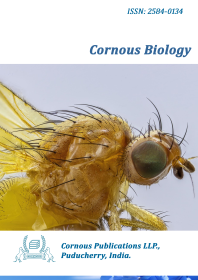

Plant hormones are a group of naturally occurring organic substances that influence physiological processes at low concentrations. Plant hormones have also been referred to as phytohormones. Plant hormones play a crucial role in controlling the way in which plants grow and develop. They stimulate cell division and elongation, promoting overall plant growth. Plant growth regulators have made the way for plant tissue culture techniques. Hormones also regulate cellular processes in targeted cells locally and then move to other locations. They affect the gene expression and transcription levels, cell division and growth.
Phytohormones, cell division, gene expression, transcription level
Aslam, A., Mahmood, A., Ur-Rehman, H., Li, C., Liang, X., Shao, J., ... & Hassan, M. U. (2023). Plant adaptation to flooding stress under changing climate conditions: Ongoing breakthroughs and future challenges. Plants, 12(22), 3824.
Bhoi, A., Yadu, B., Chandra, J., & Keshavkant, S. (2021). Contribution of strigolactone in plant physiology, hormonal interaction and abiotic stresses. Planta, 254(2), 28.
Bianchimano, L., De Luca, M. B., Borniego, M. B., Iglesias, M. J., & Casal, J. J. (2023). Temperature regulation of auxin-related gene expression and its implications for plant growth. Journal of Experimental Botany, 74(22), 7015-7033.
Brewer, P. B., Koltai, H., & Beveridge, C. A. (2013). Diverse roles of strigolactones in plant development. Molecular plant, 6(1), 18-28.
Cheng, X., Ruyter-Spira, C., & Bouwmeester, H. (2013). The interaction between strigolactones and other plant hormones in the regulation of plant development. Frontiers in plant science, 4, 199.
Hayat, S. H. A. M. S. U. L., Mori, M., Fariduddin, Q. A. Z. I., Bajguz, A. N. D. R. Z. E. J., & Ahmad, A. (2010). Physiological role of brassinosteroids: an update. Indian J. Plant Physiol., 15, 99-109.
Koo, A. J. (2018). Metabolism of the plant hormone jasmonate: a sentinel for tissue damage and master regulator of stress response. Phytochemistry Reviews, 17(1), 51-80.
Leftley, N., Banda, J., Pandey, B., Bennett, M., & Voß, U. (2021). Uncovering how auxin optimizes root systems architecture in response to environmental stresses. Cold Spring Harbor Perspectives in Biology, 13(11), a040014.
Li, L., Feng, Y., Qi, F., & Hao, R. (2023). Research progress of Piriformospora indica in improving plant growth and stress resistance to plant. Journal of Fungi, 9(10), 965.
Natarajan, A., Selvam, D., Palaniappan, K., Subbaiah Balamurali, A., Perumal, C., Durai, R., ... & Subiramaniyan, A. (2023). Standardization of the optimum effects of indole 3-butyric acid (IBA) to control root knot nematode, Meloidogyne enterolobii, in guava (Psidium guajava L.). Molecules, 28(4), 1839.
Perumal, C., Subiramaniyan, A. S., Natarajan, A., Arumugam, R., Ramasamy, A., Sivalingam, R., & Sivasubramanian, K. (2024). Dissecting the biochemical and hormonal changes of thidiazuron on defoliation of cotton CO17 (Gossypium hirsutum) to enhance mechanical harvest efficiency. Journal of Applied & Natural Science, 16(1).
Pierik, R., & Testerink, C. (2014). The art of being flexible: how to escape from shade, salt, and drought. Plant physiology, 166(1), 5-22.
Saeed, W., Naseem, S., & Ali, Z. (2017). Strigolactones biosynthesis and their role in abiotic stress resilience in plants: a critical review. Frontiers in Plant Science, 8, 1487.
Sahu, G. K. (2013). Salicylic acid: Role in plant physiology and stress tolerance. In Molecular stress physiology of plants (pp. 217-239). India: Springer India.
Salehin, M., Li, B., Tang, M., Katz, E., Song, L., Ecker, J. R., ... & Estelle, M. (2019). Auxin-sensitive Aux/IAA proteins mediate drought tolerance in Arabidopsis by regulating glucosinolate levels. Nature communications, 10(1), 4021.
Sangwan, S., Shameem, N., Yashveer, S., Tanwar, H., Parray, J. A., Jatav, H. S., ... & Poczai, P. (2022). Role of salicylic acid in combating heat stress in plants: insights into modulation of vital processes. Frontiers in Bioscience-Landmark, 27(11), 310.
Senthil, A., Ashok, S., Sritharan, N., Punitha, S., Divya, K., & Ravikesavan, R. (2018). Physiological Efficiency of Small Millets under Drought Condition. Madras Agricultural Journal, 105.
Shaffique, S., Hussain, S., Kang, S. M., Imran, M., Injamum-Ul-Hoque, M., Khan, M. A., & Lee, I. J. (2023). Phytohormonal modulation of the drought stress in soybean: outlook, research progress, and cross-talk. Frontiers in plant science, 14, 1237295.
Shah, S. H., Islam, S., Mohammad, F., & Siddiqui, M. H. (2023). Gibberellic acid: a versatile regulator of plant growth, development and stress responses. Journal of Plant Growth Regulation, 42(12), 7352-7373.
Sharma, A., Kumar, V., Sidhu, G. P. S., Kumar, R., Kohli, S. K., Yadav, P., ... & Bhardwaj, R. (2019). Abiotic stress management in plants: Role of ethylene. Molecular plant abiotic stress: Biology and biotechnology, 185-208.
Vishwakarma, K., Upadhyay, N., Kumar, N., Yadav, G., Singh, J., Mishra, R. K., ... & Sharma, S. (2017). Abscisic acid signaling and abiotic stress tolerance in plants: a review on current knowledge and future prospects. Frontiers in plant science, 8, 161.
Wu, W., Du, K., Kang, X., & Wei, H. (2021). The diverse roles of cytokinins in regulating leaf development. Horticulture Research, 8.
Zulfiqar, B., Raza, M. A. S., Saleem, M. F., Ali, B., Aslam, M. U., Al-Ghamdi, A. A., ... & Iqbal, R. (2024). Abscisic acid improves drought resilience, growth, physio-biochemical and quality attributes in wheat (Triticum aestivum L.) at critical growth stages. Scientific Reports, 14(1), 20411.
